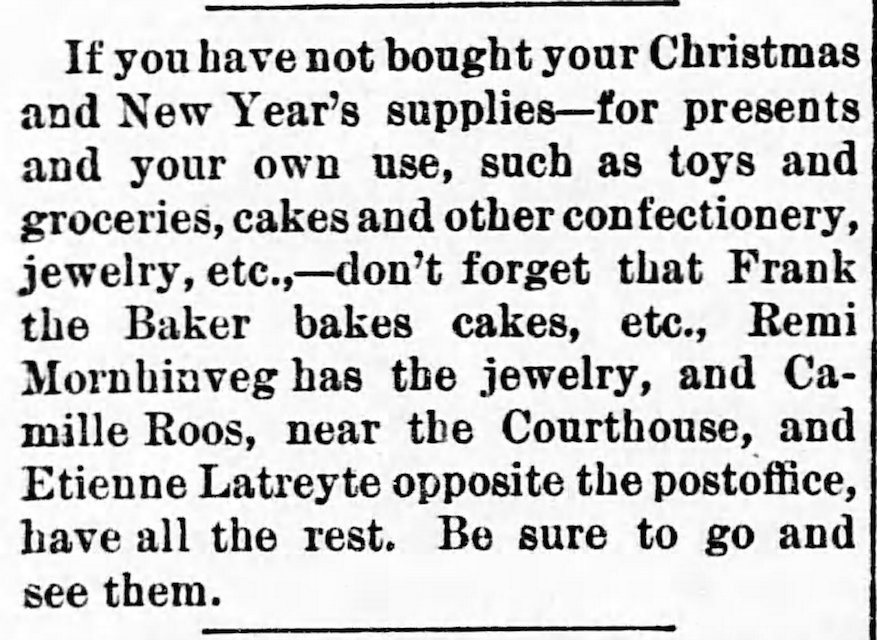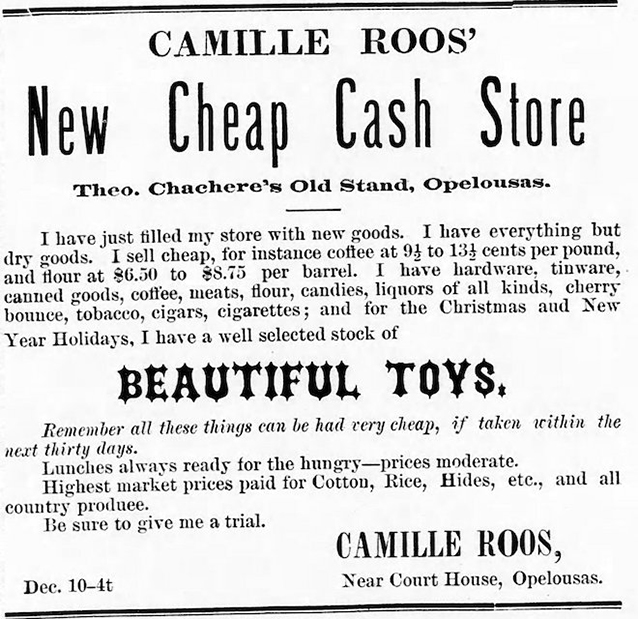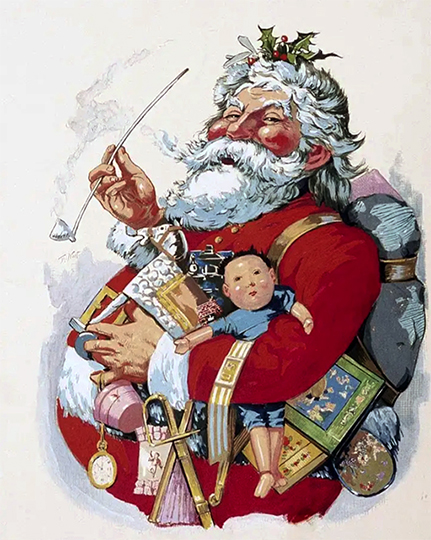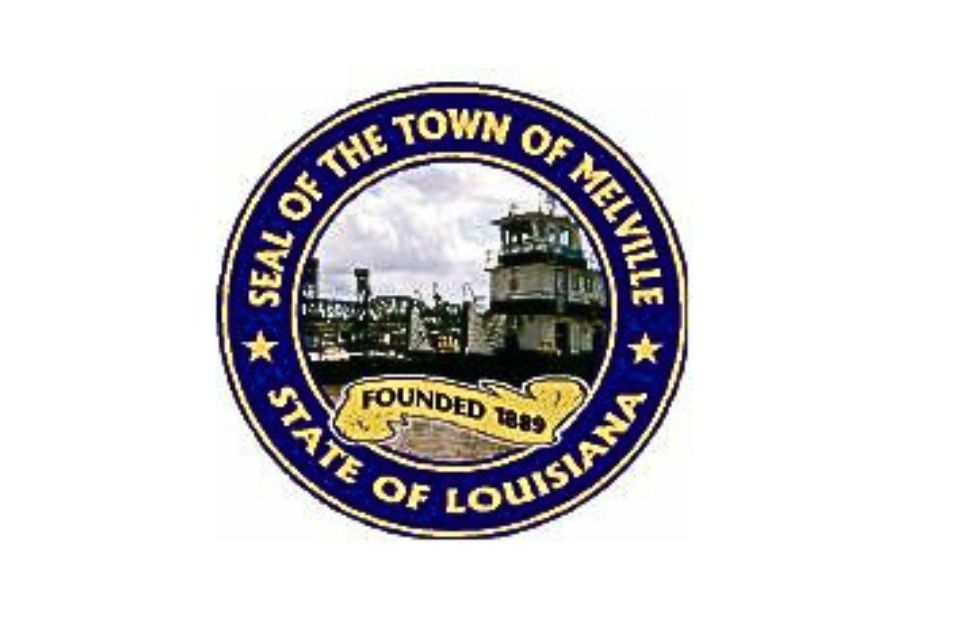Photograph: Santa Claus in 1881 by Thomas Nash
CAROLA LILLIE HARTLEY
Publisher and Contributing Writer
Tomorrow is Christmas! A day of joy as all of the Christian faith celebrate the birth of Jesus Christ.
Christmas is a religious holiday, but also considered a secular holiday in the United States. Just as was done for centuries, people here celebrate the day with religious ceremonies and also enjoy ancient holiday traditions with their family and friends.
While preparing for Christmas tomorrow, I thought about how the holiday might have been celebrated in the past in Opelousas. While doing research to find out what that might have been like, I came across this article that appeared in the St. Landry Democrat newspaper, published exactly one hundred and forty-one years ago today, Saturday, December 24, 1881.
Here is what Austin D. Williams, Publisher of the St. Landry Democrat newspaper thought about Christmas on that day:
Christmas
Tomorrow is Christmas! —a day that is supposed to bring gladness and joy to all Christian hearts, especially to the very youthful ones, that have the utmost faith in the existence of a veritable Santa Claus; but to those that have already throbbed away half of man’s allotted
life, it should also be a reminder that it is the beginning of another annual wave of time which wafts them steadily and surely to the shores of Eternity. One would naturally think from the fact that the day is intended to be the celebration of the birth of Christ, that it would be observed by all Christians and in all ages, in a solemn and religious manner, and that any joy manifested on the occasion would be of a purely spiritual character.
But such does not seem to have been the case; in fact, Christmas celebrations have partaken more of the nature of earth than of heaven. If there was, or is, any sanctity in the particular day of Christ’s birth, it is lost, as that particular day, and even the month in which it falls, is not known. In fact, there was no observance of Christmas by the early Christians. If it had been considered by the Great Ruler as a divine day, to be observed religiously as an essential part of the Christian economy it seems that it should have been so announced at the beginning. But during the earthly life of Christ, and for over a century afterwards, it was not observed; and finally, it was instituted by one of the Popes.
For two centuries it was a movable festival, like Mardi-gras and Easter Sunday, and celebrated in the months of April and May. In the fourth century an investigation was made by authority of the church, and December 25th was fixed for Christmas; but from the foregoing we may reasonably conclude that fixing it at this date was simply arbitrary, or approximate at most, and that the real day of the birth of the Savior of mankind is as certainly lost among the three hundred and sixty-five days that constitute a year, as is the identity of the ten lost tribes of Israel in the great ocean of humanity.
When Christmas was first instituted, and for many centuries afterwards, the Christian church was all Catholic or the same denomination. The manner of celebrating the day has varied in different ages, in different countries and with different religions denominations. The day in ancient times was considered one for religious commemoration and cheerful feasting. Later, during the middle ages, the manner of its observance seems to have lost in spiritual tone; then it was celebrated in a gay, fantastic manner by what we would here now call ” the Mardi-gras”—persons in masks and grotesque costumes. Singing and the music of fiddles, guitars, etc., with dancing, was also part of the celebration.
Of course, the day was begun religiously with mass; then the “inner man” was supplied with food, in order to sustain the main business of the day, which seemed to be—to use a modern expressive phrase —” to play the devil generally.”
The German manner of observing Christmas was the most beautiful, and altogether innocent. It was a children’s festival by means of the Christmas-tree, which lately has been obtained in this country—we get it from the Germans. Another way of celebrating it there in some districts, was for all the presents intended for the children in the community to be given to one person who, disguised with mask, white robe, long white hair and beard—after the idea of a modern Santa Claus —would visit each house, call for each child by name, and bestow the gifts with words of praise or reproof according to his previously ascertained knowledge of each one’s past conduct.
The old way of celebrating Christmas in England was rather boisterous and rough; but latterly it has toned down. The Puritans, when they settled New England, did not keep up the English custom in this respect, but set their ” foot down,” so to speak, on Christmas carousals.
Down South, and here at Opelousas, we have Christmas in all its glory. This is a free country, and everyone does as he pleases. Some, but very few, go to church; some have Christmas trees, and the children hang up their socks and stockings —we hope they’ll all be full tomorrow morning; some eat big dinners and drink too much wine, and have the headache the next day; some drink too much whisky on Christmas eve, get dead drunk and do not see Christmas at all; getting dead drunk is the least evil, for when not drunk to that extent, gates, signboards, etc., are liable to suffer.
Next day, the world —in this neighborhood at least — is generally considerably the worse for wear and batter —headaches, stomach aches, empty purses, empty whisky, beer and wine barrels, and a general sackcloth and ashes look, except by the few coldhearted ones who failed to celebrate the Savior’s birthday.
If Christmas was stricken from the calendar of religious festivals, and not observed at all, we doubt if genuine morality, or Christianity, would be the loser. But for all that, we wish all our readers a happy and a merry Christmas; and may they live to see many of them.[1]
Enjoy the day with your family and friends. Stay safe. From all of us at St. Landry Now, have a very Merry Christmas!
[1] From Article by Austin D. Williams, Publisher – St. Landry Democrat, December 24, 1881, Page 5.




Advertisements in the St. Landry Democrat newspaper, published in Opelousas, LA on Saturday, December 24, 1881.





